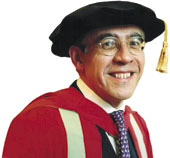So ... no need to change UK policy on Londonistan. Color me skeptical here.
The official inquiry into the 7 July London bombings will say the attack was planned on a shoestring budget from information on the internet, that there was no 'fifth-bomber' and no direct support from al-Qaeda, although two of the bombers had visited Pakistan.
The first forensic account of the atrocity that claimed the lives of 52 people, which will be published in the next few weeks, will say that attacks were the product of a 'simple and inexpensive' plot hatched by four British suicide bombers bent on martyrdom.
Far from being the work of an international terror network, as originally suspected, the attack was carried out by four men who had scoured terror sites on the internet. Their knapsack bombs cost only a few hundred pounds, according to the first completed draft of the government's definitive report into the blasts.
The Home Office account, compiled by a senior civil servant at the behest of Home Secretary Charles Clarke, also discounts the existence of a fifth bomber. After the bombings, police found an unused rucksack of explosives in the bombers' abandoned car at Luton station, which led to a manhunt for a missing suspect. Similarly, it found nothing to support the theory that an al-Qaeda fixer, presumed to be from Pakistan, was instrumental in planning the attacks.
A Whitehall source said: 'The London attacks were a modest, simple affair by four seemingly normal men using the internet.'
Confirmation of the nature of the attacks will raise fresh concerns over the vulnerability of Britain to an attack by small, unsophisticated groups. A fortnight after 7 July, an unconnected group of four tried to duplicate the attack, but their devices failed to detonate.
However, the findings will draw criticism for failing to address concerns as to why no action was taken against the bombers despite the fact that one of them, Mohammed Siddique Khan, was identified by intelligence officers months before the attack. A report into the attack by the Commons intelligence and security committee, which could be published alongside the official narrative, will question why MI5 called off surveillance of the ringleader of the 7 July bombings.
Patrick Mercer, shadow homeland security spokesman, said the official narrative's findings would only lead to calls for an independent inquiry to answer further questions surrounding 7 July.
He said: 'A series of reports such as this narrative simply does not answer questions such as the reduced terror alert before the attack, the apparent involvement of al-Qaeda and links to earlier or later terrorist plots.'
The official Home Office report into the attacks does, however, decide that the four suicide bombers - Siddique Khan, Hasib Hussain, Shehzad Tanweer and Jermaine Lindsay - were partly inspired by Khan's trips to Pakistan, though the meeting between the four men and known militants in Pakistan is seen as ideological, rather than fact-finding.
A videotape of Mohammed Siddique Khan released after the attacks also featured footage of Osama bin Laden's deputy, Ayman al-Zawahiri. The Home Office believes the tape was edited after the suicide attacks and dismisses it as evidence of al-Qaeda's involvement in the attack.
Khan is confirmed as ringleader of the attacks, though the Yorkshire-born bomber's apparent links to other suspected terrorists are not discussed for legal reasons.
The report also investigates the psychological make-up and behaviour of the four bombers during the run-up to the attack. Using intelligence compiled in the nine months since, the account paints a portrait of four British men who in effect led double lives.
It exposes how the quartet adopted an extreme interpretation of Islam, juxtaposed with a willingness to enjoy a 'western' lifestyle - in particular Jermaine Lindsay, the bomber from Berkshire.
According to the report, the attacks were largely motivated by concerns over foreign policy and the perception that it was deliberately anti-Muslim, although the four men were also driven by the promise of immortality. |
 Spring cleaning at 10 Downing...
Spring cleaning at 10 Downing...
 Australian terrorist suspect David Hicks has admitted to British intelligence agents that he trained with terrorists including "shoe bomber" Richard Reid, UK authorities said. The Guantanamo Bay detainee also is said to have told MI5 agents who interrogated him in 2003 that he received extensive training at camps in Kashmir and Afghanistan and met the late Abu Hafs, an al-Qaeda kingpin who prior to his death in 2001 was named as the successor to Osama bin Laden.
Australian terrorist suspect David Hicks has admitted to British intelligence agents that he trained with terrorists including "shoe bomber" Richard Reid, UK authorities said. The Guantanamo Bay detainee also is said to have told MI5 agents who interrogated him in 2003 that he received extensive training at camps in Kashmir and Afghanistan and met the late Abu Hafs, an al-Qaeda kingpin who prior to his death in 2001 was named as the successor to Osama bin Laden.  The Ugandan government is looking into whether Mr
The Ugandan government is looking into whether Mr  Jordan's King Abdullah II appealed Tuesday for cooperation between the Muslim world and the international community to promote the true image of Islam as a religion which rejects extremism and terrorism. "True Islam is a religion of moderation and forgiveness," the king told visiting British
Jordan's King Abdullah II appealed Tuesday for cooperation between the Muslim world and the international community to promote the true image of Islam as a religion which rejects extremism and terrorism. "True Islam is a religion of moderation and forgiveness," the king told visiting British  A British court ruled Thursday that a suspected al-Qaida member can be extradited to the United States to stand trial for allegedly plotting to set up a terrorist training camp in Oregon. The ruling came after the U.S. government reassured the court that the British defendant, Haroon Rashid Aswat, 31, would be tried at a U.S. federal court, not a military tribunal, and that he would not be designated an "enemy combatant." The American government has used that label to detain suspected terrorists at military detention centers such as Guantanamo Bay. "A trial could be properly and fairly conducted without a breach of the defendant's ... rights," Judge Timothy Workman said in his ruling at Bow Street magistrates court in London.
A British court ruled Thursday that a suspected al-Qaida member can be extradited to the United States to stand trial for allegedly plotting to set up a terrorist training camp in Oregon. The ruling came after the U.S. government reassured the court that the British defendant, Haroon Rashid Aswat, 31, would be tried at a U.S. federal court, not a military tribunal, and that he would not be designated an "enemy combatant." The American government has used that label to detain suspected terrorists at military detention centers such as Guantanamo Bay. "A trial could be properly and fairly conducted without a breach of the defendant's ... rights," Judge Timothy Workman said in his ruling at Bow Street magistrates court in London. PARIS (AP) - An Algerian man suspected of involvement in a bomb attack on the Paris subway a decade ago was extradited from Britain to France on Thursday, British and French officials said. Rachid Ramda, who spent 10 years in jail in Britain, allegedly provided funds for the bombers of the July 1995 attack, which killed eight people and injured 87 on the Paris Metro system.
PARIS (AP) - An Algerian man suspected of involvement in a bomb attack on the Paris subway a decade ago was extradited from Britain to France on Thursday, British and French officials said. Rachid Ramda, who spent 10 years in jail in Britain, allegedly provided funds for the bombers of the July 1995 attack, which killed eight people and injured 87 on the Paris Metro system.